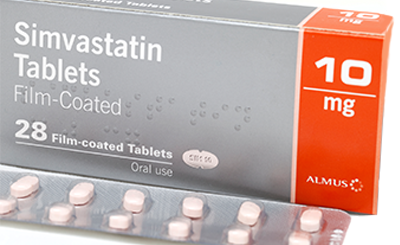SSRI-Statin Combination May Be More Effective Than SSRIs Alone
Abstract
Compared with SSRI treatment alone, the combined use of an SSRI and a statin was associated with a significantly lower risk for both psychiatric hospital contacts and psychiatric hospital contacts due to depression.

Cholesterol-lowering statins may boost the effectiveness of antidepressants in treating patients with depression, according to a study published last month in AJP in Advance.
The findings support the hypothesis that the inflammatory process and the neurochemical mechanisms of depression are closely linked, as statins are known to have anti-inflammatory properties.
To compare longitudinal data of people who took selective serotonin reuptake inhibitors (SSRIs) and statins at the same time with those who took only SSRIs, Danish researchers led by Ole Köhler, M.D., relied on the country’s national health care database and psychiatric registries from 1997 to 2012.
Köhler and colleagues identified 872,216 incident SSRI users. The most frequently used SSRIs were citalopram (57.2 percent), sertraline (17.1 percent), and escitalopram (11.4 percent). Of those taking SSRIs, 113,108 (13.0 percent) used a statin concomitantly (simvastatin, 12.0 percent; atorvastatin, 0.6 percent; pravastatin, 0.2 percent; rosuvastatin, 0.1 percent; fluvastatin, 0.04 percent; and lovastatin, 0.02 percent).
People who were taking the drug combination were less likely than those who were taking only SSRIs to receive inpatient, outpatient, or emergency care at a psychiatric hospital in Denmark for any diagnosis as well as for depression in particular. The risk ratios of SSRI-statin combination versus SSRI-only were 0.75 for any psychiatric hospital visits and 0.64 for depression-related visits, and both were statistically significant.
As the study was observational and retrospective, the researchers tried to control for patient characteristics that may skew the findings, including sex, age, education level, concurrent mental disorders, health status, and the use of other anti-inflammatory drugs.
“In a large naturalistic cohort, concomitant treatment with SSRIs and statins resulted in robust advantages compared with SSRIs alone,” the authors wrote.
It has long been observed that patients with depression often have elevated cytokines—hormones circulating in blood that regulate inflammation throughout the body.
Although the precise effects of inflammation on the brain is still poorly understood, evidence such as the Danish study suggests that reducing inflammation may help treat depression.
In a previous randomized, double-blind, placebo-controlled clinical trial, Ahmad Ghanizadeh, M.D., and Arvin Hedayati, M.D., showed that a combination of lovastatin and fluoxetine led to a small but statistically significant reduction in the severity of depression after six weeks of treatment compared with patients who received fluoxetine plus placebo. That study was published in November 2013 in the journal Depression and Anxiety.
Another recent meta-analysis of three randomized, double-blind, placebo-controlled trials supports the notion that statins are effective in treating depressive symptoms in combination with antidepressants. This meta-analysis was published in the April 27 issue of the Journal of Affective Disorders.
While statins carry some risks, such as a rare side effect of muscle damage known as rhabdomyolysis, these studies report no additional safety concerns in patients with depression. The Danish authors reported that the combination of SSRIs and statins did not increase the likelihood of death or suicidal behaviors (suicide and attempts) compared with SSRIs only. The meta-analysis also found no increased adverse events with the combination treatment.
“[T]he results from this large naturalistic cohort study are in accordance with those from prior studies, … and indicate that the antidepressant potential of the SSRI-statin combination should be subjected to further testing in larger randomized controlled trials,” the authors concluded. ■



